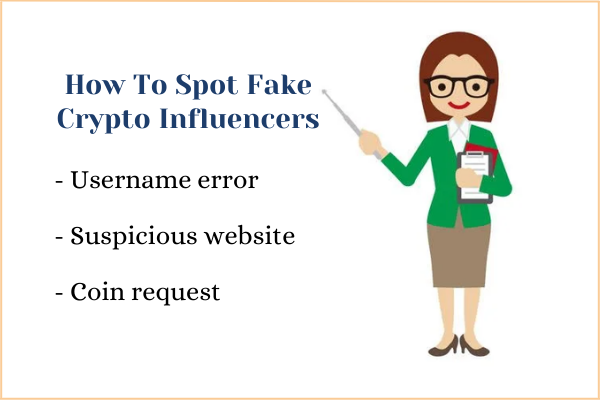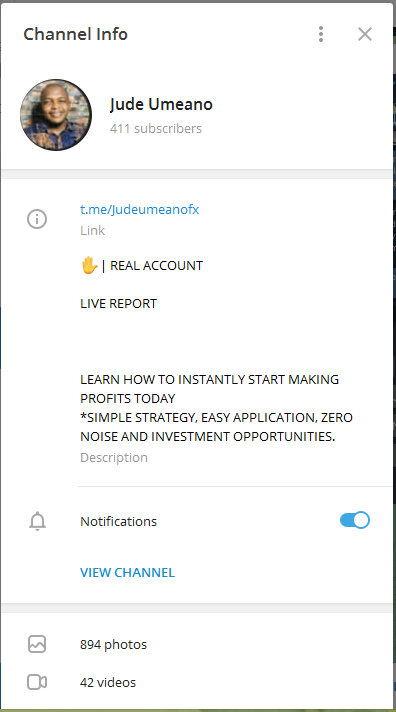In this article, I’ll show you how to spot fake Crypto influencers and avoid being scammed.
There have been reports of many crypto scams on social media, especially on Telegram and YouTube.
Sadly, some of these scammers use the faces of crypto influencers like Jude Umeano, Crypto Banter, Bankless, etc.
And they are stealing large funds from unsuspecting individuals.
Keep reading to learn how to spot these fake influencers and save your money.
Post Summary
- Attributes Of Fake Crypto Influencers
- How To Spot Fake Crypto Influencers
- What Are Social Media Apps Doing About These Scams?
- Conclusion
Let’s roll…
1. Attributes Of Fake Crypto Influencers

Before we talk about how you can spot a fake crypto influencer, let’s look at how they operate:
a. Promoting a new project
A very good pointer to a fake crypto influencer is when he announces a “promising” project on his timeline.
Then he provides a wallet address and requests his followers to send a particular crypto to it, say, ETH to help them earn the token of the new project.
He convinces them that as an influencer for the project (and with their funds), he’ll ensure they receive the new tokens very fast.
Don’t fall for it, he’s a scammer.
b. Private message from a group
Another way to know a fake crypto influencer is when he slides into your Dm to offer assistance.
Let’s say the new project has a Telegram group and conversations are ongoing there.
After the fake influencer hypes the project on the general platform, he then slides into your Dm.
Usually, they do this for new members of the group or any member asking questions on the group.
People fall for this one because they feel like the imposter is more experienced and will really help them.
But it’s just a matter of time before the person takes their money without helping them and they’ll realize that they’ve been scammed.
My friend almost fell victim recently. She had joined a group and asked a few questions.
Only for an imoposter to contact hear directly offering to help sort issues.
He also asked for her details so that he’ll log into her account, and help her faster. Jackpot!
c. Special Offers
Fake influencers also create contests with mouthwatering benefits.
They may pretend like they’re promoting a new product by one of the top exchanges.
Also, they will set up requirements that will pressure you to participate and quickly release your funds to them.
Sometimes, they request your private keys, your password, or your recovery words in a bid to help you cash in quickly in an exchange’s promo.
Be wary to complete random Google forms that collect personal information such as email and wallet addresses.
Always remember that private keys or seed words should only be entered in official wallets obtained from official sites.
d. Proposing solutions in the comments section
Another way these influencers operate is by commenting on the videos or articles of others.
Their comments usually centers on a better solution than what was mentioned in the material.
For example, under a video/article of how to withdraw naira from Luno, an impostor may comment that he can help viewers retrieve their funds via a faster means.
Even where a problem was not aforementioned, you may still find a comment about high-yielding investment opportunities.
His goal is to lure people to contact him directly then he’ll scam them.
I have seen imposters comment on YouTube videos offering to help viewers with one thing or the other.
Some pose as the admin of a known project and offer tech support.
They go as far as dropping their phone numbers, asking to be contacted directly.
If you fall for it, they’ll tactically get vital information from you and steal your funds.
e. Give less and take more
Fake crypto influencers also try to convince people to send them little coins to gain more coins.
For example, the scammer may claim that he needs 1,000 ETH to invest in a project that will yield 100x return.
He’d go on to say that he doesn’t want to partake in the big opportunity alone.
Next, he’ll make a “generous” offer:
The first ten people to send 10ETH to his wallet address to help him grab the opportunity will receive 20ETH from him when the project pays off. Ridiculous!
It just like what happened in 2020 when more than $2 million in cryptocurrency was transferred to Elon Musk impersonators. Ouch!
As mentioned, they’ll predict that the project will do well within a short time frame to pressure people to pay up.
Don’t fall for it. Any influencer that offers to give you more coins if you first send a few, is a fake!
f. They ask for money to influence for you
Lastly, I want to talk about fake crypto influencers scamming new projects.
Because crypto influencers have a large following, a scammer would pose as a popular influencer and ask you to pay him to talk about your project.
He will promise you that his followers will invest in your product because he’s very convincing.
Normally, if a large influencer is optimistic about a project, it will gain traction in his community almost immediately.
Since he is bearing the same name and photo as the popular influencer that he is imposing, you may be lured to take his word for it.
After all, you want many people to invest in your project and if a big person is offering to save you the stress of advertising, why not?
Note that a real influencer wouldn’t contact you, he’d wait for you to contact him first (not always though).
These imposters start by complimenting your team, offer you huge ‘discounts’, and then pressure you to pay them (usually in crypto) for advertising work.
And once you make an initial payment, they’re off the radar and your money is gone.
Here’s an example of a scammer posing as David Hay, a popular crypto enthusiast:
I have also found crypto influencers warning against imposters on Twitter e.g. @boxmining, @crypto_bobby, and @QuintienFrancois
That said, let’s get into the main purpose of this article.
Tag along!
2. How To Spot Fake Crypto Influencers

a. Username error
The first thing is to visit their profile and check their username.
In Telegram for example, an imposter can easily copy a profile picture and bio but he cannot copy the username.
The original account may bear @SuperTechSupport88 but the imposter has @SuperTechSuqqort88 as username.
If you’re not careful, you won’t be able to spot the difference because the bio and the pic are the same.
So, you want to bear that in mind.
b. Suspicious website
Another thing that gives fake crypto influencers away is the site they use to promote a project.
If you click on the site and it is a single page with a countdown timer showing how soon the project will end, you should rethink it.
Again, if the telegram link on the project’s website doesn’t link to the group where the individual chatted with you from, it is also a red flag.
Look at these images from two Telegram channels:
Notice that they both bear Jude Umeano and his picture but the channel links are different.
They are both scammers posing as the popular crypto influencer – Jude Umeano.
Unfortunately, thousands have subscribed to the channels.
c. Coin Request
Thirdly, if the imposter is requesting that you send ETH or BTC to receive a coin that you know nothing about, run!
Sometimes, you may even know the coin of interest.
Probably, it is yet to launch and you were invited to join the Telegram group.
Only for a so-called admin to chat you up directly to send ETH or BTC to receive a spot to get the coin before its public sale. Typical scammer!
E.g. Before the $DOME launched, a scammer on Telegram published a wallet address for users to send funds to receive the coin on PancakeSwap
You can bet that anybody who fell for the lie has lost whatever coins they sent to the given wallet address to receive $DOME.
It’s worse when they do not even have their user accounts in the main project chat group.
They use a secondary account in the main chat group to observe when new users show up or users that have questions.
Then, they use their scam accounts to send a direct message to those users.
If you’re approached in a direct message, do either of these three things;
- tell the person to talk in the main group.
- screenshot the chat or his profile and post it in the main group and ask for confirmation.
- check their profile to see if they are a member of the main group. If not, don’t continue the conversation.
Moving on, let’s see what social media apps are doing about these bad actors.
Keep reading!
3. What Are Social Media Apps Doing About These Scams?
From my observation, they depend on users to report the scammer before taking action.
In Telegram for example, if users report an account or Telegram bot as a scam, Telegram will now flag it as a scam, warning new users of previous negative feedback.
On YouTube as well, when you report a fake account, it is suspended for further investigation.
And if you’re following the real crypto influencers on Social Media, you must have seen their posts on fake accounts they have reported.
I have seen quite a number so, let’s be careful.
Apart from fake crypto influencers, other online crypto scams exist including:
- – Rug pulls
- – Signal groups
- – Pump and dump
- – Clouding mining scam
- – Pyramid scheme, etc.
You can learn more about them here.
4. Conclusion
Telegram and YouTube are the top go-to platforms for discussing anything crypto.
However, they have also attracted unwanted attention from scammers.
Please, take note of all that I have said in this article so that you don’t fall victim.
This is where I’ll draw the drapes. I hope it was a good read.
Now, I’d love to hear from you, have you encountered a fake crypto influencer before?
Please tell me your experience in the comments section below.
Also, share this post with your friends, you may be saving someone good money.








0 Comments